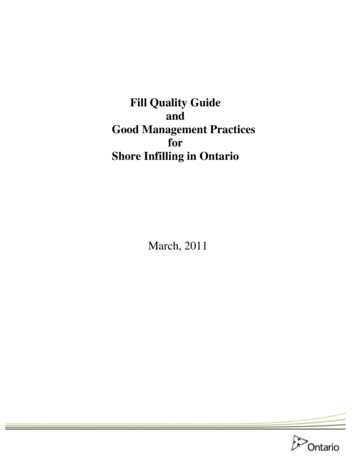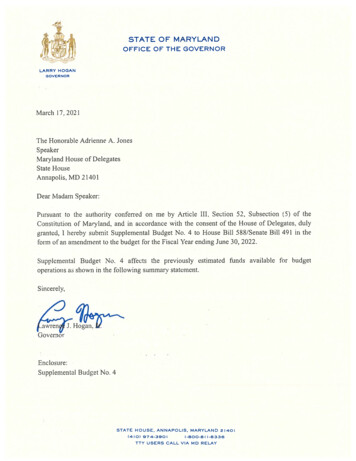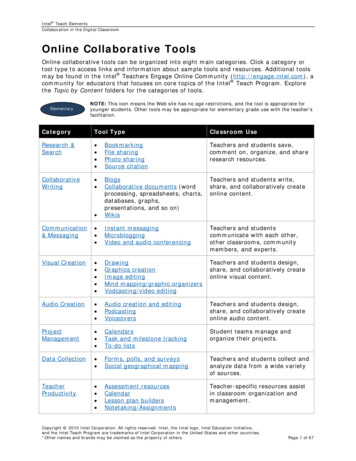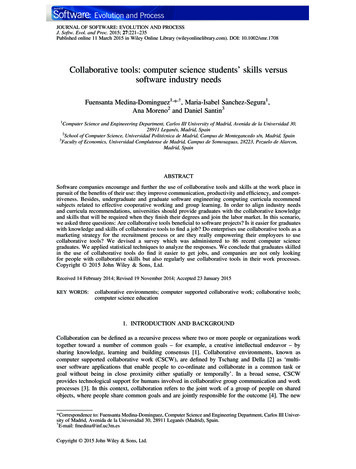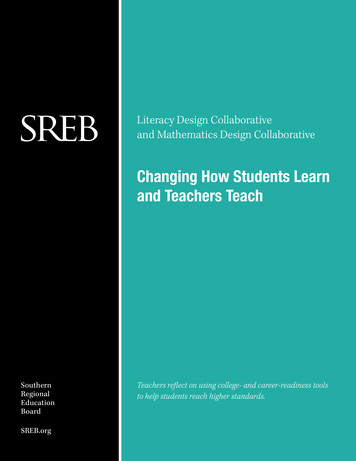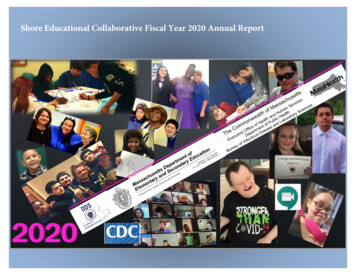
Transcription
Shore Educational Collaborative Fiscal Year 2020 Annual Report
Shore FY20 Annual ReportDecember 2020Dear All –On behalf of Shore’s Board of Directors, I am proud, as always, to share with you Shore’s annual report for Fiscal Year 2020. Thisyear’s cover page reflects the Shore world, before and after the coronavirus pandemic changed the world at large. Ironically, last yearwe featured our newly renovated building in Chelsea, and remain proud of our continued opportunities to expand our services tochildren and adults. However, these last months have clearly demonstrated that Shore’s heart and soul, exists, in fact thrives,separately from our brick-and-mortar classrooms and programs. Establishing and nurturing connections between Shore staff andstudents, adults, and families were more important than ever. We reached out through virtual meetings; texts and calls; and deliveriesof chromebooks, ipads, groceries, and care packages of gloves, masks and hand sanitizers for those in need.Like all school districts in the state, Shore closed on March 13th, presumably for a few weeks. On Monday, March 16, our LeadershipTeam met for the first of many, many times, with the goal of ensuring that all students, adults, and families were contacted at leastonce a week by trusted Shore staff. Nurses, teachers, social workers, paraprofessionals, therapists, program managers, direct servicesstaff, business office personnel, secretaries, facilities staff, and administrators ALL “virtually” came together to continue the workembodied in Shore’s mission. Communication systems were quickly developed to ensure that no one in the Shore community wasmissed and those who were struggling, were more frequently and closely contacted by the people who could best assist. At the sametime all of our educators, service providers, and support staff became learners themselves. We needed accelerated, “on-the-job”training in using technology that would become the new and long-term platforms for school, support services, and business operations.The Shore I.T. team stepped up as our MVP’s – providing on-demand trainings, posting videos, scheduling small group and individuallessons for nearly 300 staff and over 500 families/caregivers.After the return of some normalcy and with enough time, we will all be in better positions to reflect on the long-term effects of thisonce-in-a-century pandemic on our school systems and organizations. FY2020 changed Shore. I am confident that the collective spiritstrengthened by the challenges of the year, will manifest itself in leading us forward in growth, innovation, and always, strongconnections.Sincerely,Jacquelyn ClarkExecutive Director2
Shore FY20 Annual ReportShore’s Board of DirectorsPaul Ruseau, ChairpersonCarrie Normand, Vice ChairpersonNo RepresentativeHenry WilsonDavid Ela , Former Chair (1/2006 - 12/19)Millie Cardello (1/1/20 – Current)John Froio/Lenny Iovino (1/1/20-6/30/20)Stacey RizzoNo RepresentativeValentino CapobiancoJoseph SaccoAttorney Howard GreenspanShore’s rettMaldenRevereSaugusWinthropTreasurerBoard CounselIndividuals First: We place the interests and needs ofour students and adult participants first.Excellence: We strive to be exceptional inour programs and in our professions.Respect: We embrace our community of diversebackgrounds, experiences, beliefs, and perspectives.Compassion: We are kind and empathetic tothe extraordinary people we serve.Integrity: We make our decisions based onhonesty and strong moral principles.Accountability: We accept ownership forour decisions and commitments.Shore’s Leadership TeamExecutive TeamJacquelyn Clark, Executive DirectorRobert Alconada, Assistant Executive DirectorBarbara Galatis, Executive AssistantStudent ServicesDonna Pierce-Judkins, DirectorLisa Hunt, Educational CoordinatorJudy Lynch, Clinical CoordinatorCathy MacNeil, Educational CoordinatorStephanie Brant, Educational CoordinatorAdministration and FinanceGene LaCava, Chief Information OfficerLori Maida, Human Resources DirectorDebbie Puleo, Operations AdministratorJace Arrington, Facilities ManagerMaureen McCarthy, Educational ConsultantAdult ServicesMichelle Amero, Program CoordinatorDonna Carrington, Program CoordinatorKate Dufort, Program Coordinator3
Shore FY20 Annual ReportSTUDENT SERVICESThe Intensive Multiple Modalities Program (Shore Program Code 105) provides comprehensive services to students with multiple, complex disabilities (physical, health, developmental and intellectual impairments)from ages 3-22. The program provides specialized instruction to students whose disabilities significantly impact their educational performance ingeneral education settings. Students participate in academic, vocational, community and recreational activities. Computers, ipads, assistivetechnology, switches, etc. are used with students by occupational and speech therapists as well as teachers and aides. The goals are to improvecommunication as well as to optimize independence. This program is richly enhanced by related services: physical and occupational therapy, speechand language services, nursing and mobility training and other low vision services. In addition to individualized services provided to students basedon their IEPs, therapists and nurses are often in these classrooms, assisting students to access the curricula and engage in school activities to theirfullest capacity. The program offers wheel chair and orthotics clinics on site for the convenience of students (and their families) for whom medicaland rehabilitative appointments are often difficult.(5) Classrooms in this program are located at the Henry Owen School in Chelsea.The Intensive Skill & Language Development Program (Shore Program Code 105) is designed to meet the needs of students diagnosed with Autism Spectrum Disorders, Developmental Delays, Intellectual Impairments, and/orCommunication Impairments. The program serves children between the ages of 3 and 22. Additionally, these students may be exhibiting behavioraland learning challenges that make it difficult for them to be successful in their community school. Our integrated therapy approach provides a boardcertified behavior analyst, speech/language pathologists, occupational therapists, physical therapists, music therapists that work with the classroomstaff to ensure the entire student's needs are met. The curriculum utilizes a teaching approach based on the principles of applied behavior analysistechniques, direct instruction, discrete trial training, task analysis, total communication, integrated therapy techniques and hands-on experiences.(9) Classrooms in this program are located at the Henry Owen School in Chelsea.The Elementary Therapeutic Day School (Shore Program Code 305) provides a highly structured environment for students who have emotional, behavioral, health impairments and social adjustment difficulties thatimpact their abilities to make effective progress in traditional school settings. The program serves students in grades PK-5 and includes students with avariety of academic and cognitive abilities. In addition to emotional and behavioral disabilities, students in this program may have learning disabilities4
Shore FY20 Annual Reportsuch as dyslexia or dysgraphia, as well as organizational, processing and communication challenges.The setting allows for small class sizes, structured behavioral programming, an individualized teaching approach and the use of a variety of instructionalmethods to motivate the students. The curriculum is taught using small groups at differentiated instructional levels while adhering to the MassFrameworks and the Common Core. Each year scaffolds upon the previous year’s skills creating an enriching environment but offering repetition inskills needed by students to ensure learning. Lessons are accompanied by visuals, manipulatives, motivating hands-on projects and the use oftechnology to allow students to extend their learning to real life applications.Social emotional curricula and instruction are embedded in all activities of the day. Strategies from Responsive Classroom, Social Thinking, PBIS, andYoga/Meditation are used to teach and encourage social skills and emotional regulation. Individual and group counseling and behavioral services;speech and occupational therapies; art and adaptive physical education are provided to all students, according to individual IEPs.(6) Classrooms in this program are located at the Henry Owen School in Chelsea and(1) Classroom is at the Columbus Elementary School in Medford (Shore’s 405 Program).The Therapeutic Middle & High School Program (Shore Program Code 315) serves students in grades 6-12 who have demonstrated difficulty progressing in regular educational settings due to significant social/ emotionalimpairments, behavior problems, and/or learning disabilities such as executive functioning/organizational issues or attention difficulties.In order to make academic progress, students benefit from therapeutic, academic settings that offer them the accommodations and supports that arenecessary for them to reach their greatest potential. The program allows for small class sizes, structured schedules and expectations, and schooladjustment counselors who set individualized goals with all students. These clinicians are involved with students’ families or residential providers,therapists, DCF workers, probation officers and other collaterals in order to holistically understand and support students’ learning as well asemotional needs. Differentiated instructional methods are used to meet, remediate and motivate students. All instruction is based on theMassachusetts StateFrameworks and Common Core. Students from ages 14 up, receive transition assessments and services. Counseling services (individual and group) aswell as speech and occupational therapies are provided according to individual student’s IEPs.(7) Classrooms in this program are located at the Henry Owen School in Chelsea and(1) Classroom is at the Belmont Middle School in Saugus5
Shore FY20 Annual ReportShore Educational Collaborative’s mission is to demonstrate excellence, expertise,and experience that will make us the agency of choice for students and adultswith unique challenges and abilities. EvaluationsA. Extended EvaluationsShore provides extended evaluations for students when their IEP Teams need additional assessments and information in order to developeducational plans that fully meet students’ needs. Extended evaluations cannot exceed (40) days and are not considered educational placements.The IEP Team may meet during the course of an extended evaluation period, but always meets before the evaluation period is concluded toreview and discuss the findings of these additional assessments. At this meeting, the Team develops a complete IEP for the student, and mayconsider a change in placement if it believes that the student may require this is order to be successful.B. Interim Alternative Educational SettingsDistricts may refer students with disabilities who have violated disciplinary policies to Shore for the purpose of conducting further assessmentsand making recommendations. If this is the case, the IAES is considered a change in placement. Students are immediately assigned clinicianswho conduct formal assessments using the clinical inventories most appropriate to the students’ ages and presenting problems as well asobservational assessments. Students are integrated into an age/grade appropriate classroom for the 45-day period so that academic classworkcontinues without interruption. Halfway through and at the end of the 45-day placement, team meetings are convened and written reports arepresented. These include assessment results and particularly, recommendations for intervention strategies -- both instructional and behavioral -- thatmay be effective in meeting students' needs.DISCUSSION OF EFFECTIVENESSThe differences, or cost aversion, between Shore’s tuitions and comparable private schools, are considerable across all program types. Annual savings(Shore relative to privates) range from nearly 17,000 to 42,700 per student . In addition, these annual tuition costs are based on 180 days of schoolwhen many students attend an additional (30) days in the summer. All of our students in the 105 programs and most in the therapeutic elementaryprogram require extended year programs. Finally, transportation costs are considerably reduced when students attend Shore rather than schools incommunities much further from their homes.6
Shore FY20 Annual ReportSHORE VS. COMPARABLE PRIVATE SCHOOLSProgramMultiple DisabilitiesLanguage-Based/DDElementary TherapeuticMiddle and High TherapeuticShore Annual Tuition based on 180days (includes all related services)Comparative Private School AverageAnnual Tuition – based on 180 daysVariance/Savings 56,093 82,235 26,14247% 56,093 98,772 42,67976% 54,509 71,466 16,95731% 51,883 82,403 30,52059%Shore Annual Tuition based on180 days (includes all therapies) Savings per student of an average 29,000a year is significant. However, districts thatenroll five students at Shore save an averageof 145,000 annually Thirty-five students enrolled represents a costdifference of more than 1 million per year overcomparable private schools.
Shore FY20 Annual Report************In FY20, Shore Student ServicesClassrooms were located at:Shore Owen School 100 Revere Beach Parkway ChelseaColumbus School Medford (one classroom)Belmonte Middle School Saugus (one classroom)***************The chart on the right depicts four fiscal years of studentFTE’s (the number of students billed for 100% school days permonth.) Trends can be sn in most years with increasingenrollment from the start of school to January. Growth declines orremains steady until the last quarter when enrollments increase atthe highest rate of the year. FY20 was aberrant in several ways –even before the pandemic. Starting numbers were typical, in fact,higher than 2017 and 2018. However, enrollment growth wasmuch flatter than other years and the deceleration much earlier(beginning in November).Of all years to miss the last quarter "boost" of newreferrals, closing in March during an already unusually low censusyear, had a deleterious effect on Shore's FY20 budget. Since wetypically open the school year with 20 to 25 students fewer thanthe previous year end, the impact of this year will need to bemanaged throughout FY21.8
Shore FY20 Annual ReportADULT SERVICESThe mission of Shore’s Adult Services program i s to provide individualized work, community and educational opportunities that enable persons withhighly diverse challenges, skills, and interests, to lead the most independent and productive lives possible. Individuals range in ages from 22 to 70 years old. They live in community residences, with families, and a few still, in state schools. Individuals commute to Shore programs from overthirty different Massachusetts cities and towns. Individuals who participate in Shore’s services are unique in their multiple physical, medical,sensory impairments or significant behavioral challengesTwo general service models are provided at each of Shore’s three program locations. Individuals, through their Individual Support Plan (ISP) or DayHabilitation Service Plan (DHSP), may be referred to participate in one of these programs exclusively or a combination of services from bothprogram models.Employment and Community Services: Community Based Day Services include opportunities for true community integration, in areas that interestthe individuals involved. These may include employment, volunteering, joining a club or organization, shopping or banking, becoming “regular”aatacoffee shop or health club. The goals are for individuals with disabilities to fully explore their interests, exert control over and direct their own livesto the fullest extent possible, and be fully accepted members of the community. To this end, Community Based Day and Supported Employmentservices at Shore focus on assisting our individuals in building skills and exploring or cultivating interests so that they can be confidant andsuccessful.Day Habilitation Services include skill acquisition and therapeutic services so that people are more self-reliant, independent, and interactive at Shore,their homes and in their communities. Nurses, occupational, speech/language, and physical therapists, mobility and behavior specialists, all evaluateparticipants in this program component and serve, along with program case managers, as the interdisciplinary teams that develop and monitor theprogress of their individualized DHSP’s. Individuals work on their goals in a variety of functional contexts, both at program sites and in thecommunity.Behavior Services and Nursing Plans of Care are incorporated into either or both of the program modelstosupportparticipants’extraordinary needs.Many people have behavior support plans to assist in successfully treating (reducing and eventually eliminating) challenging behaviors that interferewith one or more meaningful life areas. All behavior plans are reviewed and approved by individuals or their guardians.Shore’s nurses and therapists work along-side staff, to support individuals who are medically complex. Individuals generally have multipledisabilities and/or health conditions that require specialized supports, frequent monitoring and/or nursing interventions. In addition to directservices, special9
Shore FY20 Annual Reportevaluations for adaptive equipment, swallowing disorders, assistive technology, are often arranged and conducted at the program sites. Activetreatment goals are the same for these participants as all others: to be as self-reliant as possible, to be exposed to new interests and activities, and tocommunicate their preferences in whatever ways they can. Nurses and Program Managers maintain frequent communication with individuals’families and residential service providers to ensure continuity of care and supports for optimal health and safety. Shore staff, therapists, and nursesknow individuals so well that health changes are often detected early enough to prevent more serious illnesses and hospitalizations.The Department of Developmental Services (DDS) and the MassHealth Office of Long-Term Support & Services (LTSS) provide referrals, fundingand regulatory authority. Specifically, DDS contracts with Shore to provide community-based day services (work opportunities) andsupplementary behavior and health supports for individual participants. DDS Quality Assurance surveys and certifies services every two years.Individuals’ MassHealth benefits fund their day habilitation services that are regulated by Mass Health's Office of Long-Term Services andSupports. The Adult Services Division is proud to be accredited by CARF, an international accreditation organization.Adult Services programs are located in Chelsea, Peabody and Woburn.DISCUSSION OF EFFECTIVENESS:Shore is the largest provider of Adult Services among the state’s educational collaboratives.Since rates are set by Department of Developmental Services (DDS) contracts and Mass Health day habilitation regulations, there are no tuitiondifferences among providers of Adult Services. However, indicators of effective service provision are demonstrated in the following ways.10
Shore FY20 Annual Report The numbers of individuals served (361) and revenue generated ( 9.5M) clearly indicates that Adult Services continues to be a sought-afterservice for state partners, families and individuals. The overhead generated by this service (more than 950,000 in FY20) continues tosupport the strong infrastructure of Shore, such that our human and capital resources in all divisions benefit. Adults who attend Shore live in 58 different communities. 35% reside in Shore member communities. Many adult participants attendedschool at Shore and then transition at age 22 to adult services. Shore participants tend to stay for years at our programs, a few evencelebrating 40 year "careers”. We are proud that we can support people with disabilities and their families across their lif e spans.Shore Adult Participants Residingin Member Communities233 6101214152715Formal satisfaction surveys are conducted annually with individuals,their families, friends, and DDS staff. Over 90% of all respondentsexpressed a high degree of satisfactions with Shore’s staff,communication with stakeholders, safety and appearance of itsfacilities, and the services designed and implemented to meetindividuals’ goals.Adult Participants commute from 58 different cities and towns to attend ShoreDay programs in Chelsea, Peabody, and Woburn.11
Shore FY20 Annual ReportA DULT PA R T I CI PA N TS: N EW A N DDI S CHA R G ED I N F Y 2020Shore’s Adult Services Programs welcomed in (24) new participantsin FY 20, the highest number of new enrollees in recent years.Unfortunately, a record number (16) individuals left Shore servicesover the course of the year. Of these, 12 individuals died during FY 20,5 from the scharged295New12102SHORE DISTRICT ***Transition Assessments &Consultation HOME TRAINING56%DISTRICT SUPPORT SERVICESHome TrainingOut Of District 14ETL Leadership Shore provides home-based services to families of students with disabilities who reside in member school district communities and when students havethese services specified on their I.E.P.’s. Initial assessments of students’ strengths and areas of need as well as families’ support systems and capacities aredone at the onset of services and guide the delivery of services. Practical strategies are taught and role modeled for families in the areas ofcommunication, social, play and self-help skills. Community-based skills are strengthened through role modeling and rehearsal in “real life situations”.As recommended by physicians, psychologists and IEP Team members, students may require direct skill acquisition services and/or specificinterventions, such as discrete trials training. These services are accessed by referrals from the school district. Home trainers observe the students’behaviors and skills in classroom settings; attend student IEP and other team meetings when appropriate. Shore home trainers facilitate quarterlyparent training workshops designed to increase networking, resource sharing, and troubleshoot common issues and problems. Similar workshops andforums have been provided to early learning teachers who work with at-risk 13preschoolers.
Shore FY20 Annual ReportTransition ServicesShore’s College/Career/Future-Ready (CCFR) Extension Program is a collaborative network of partnerships involving Shore EducationalCollaborative, local school districts, community-based businesses and organizations, and post-secondary training/higher education programsworking together to provide high school students with disabilities an opportunity to prepare for the future through inclusive ‘real-world’ learningexperiences in a variety of careers, job sites, and community-based settings.With support of Shore’s Job Developers/Community Coaches/Mentors, students develop community-based ‘career readiness’ skills and personalnetworks, as the coaches work to match each student’s vision for the future with certain types of skill-building experiences across variouscommunity-based businesses and organizations, using a variety of strategies and opportunities.Referral to/Enrollment in Shore’s CCFR Extension program is made through the student’s school district special education liaison. S/he will completeand submit the student’s Transition Plan and CCFR Referral form to the Special Education Director for approval.CCFR Services are packaged and include an intake/planning meeting, transition consultation, portfolio, and 24 hours of personalizedcoach/mentoring connected to the student’s vision.This has become a valuable service to districts, students and their families in providing cost effective, peer support to supplement in-school transitionservices. Students work with their Coaches in community settings, visiting colleges, applying for and getting jobs, learning interpersonal and “realworld” skills. For many students, these opportunities truly help them to develop a real vision for their futures and the skills and confidence toactualize their goals.Shore’s Transition Staff also assist secondary teams in building their in-district capacity for supporting students’ transition work, through attending teammeetings, consulting to teachers/administrators, and facilitating connections to state and community partners. Referrals can also be made for personcentered assessments and plans in cases where transition service planning has been stalled or difficult for a variety of reasons. These referrals should bemade through the district’s Special Ed Director/designee and are billed on an hourly basis.MUNICIPAL MEDICAID BILLINGShore Educational Collaborative provides Medicaid billing services to School Districts, as part of the state’s school-based claiming program. Some yearsago, Shore developed and continues to support the web-based software that practitioners use to electronically enter and submit data to Shore(ShoreDoc) . Shore provides contracting member and non-member school districts with three different types of billing for Medicaid reimbursement:
Shore FY20 Annual ReportDirect Service Claiming:All Medicaid eligible special education students who have eligible health/clinical related services identified on their IEPs and have parentauthorization are billed for these services. The billing is processed on a monthly basis, submitted to Mass Health and districts/communities arereimbursed.Administrative Activity Claims:Administrative Activity Claims (AACs) are processed on a quarterly basis. The claims consist of the quarterly expenditures for SpecializedTransportation, Chapter 766 Tuitions, capital costs, salary and fringe benefit costs for employees listed on the quarterly RMTS Random MomentTime Study (RMTS) templates, and indirect costs. School districts submit the information to Shore for billing and reimbursements are returned totheir communities.Annual Cost Reports:The Annual Cost Report consists of the information for the salaries of all the therapists and nurses that provided the direct care therapeutic andmedical services to those who are Medicaid eligible.MEDICAID REIMBURSEMENT TO DISTRICTSTHROUGH SHORE SCHOOL BASED CLAIMING pswichMaldenMedfordMystic ValleyNortheast Voc Tech SchoolRevereRockportSaugusShawsheen 213,412.12 1,213,997.98 91,047.05 46,711.80 783,001.13 435,199.90 5,090.14 63,782.30 635,316.90 72,362.26 154,214.80 25,909.84 92,297.46 448,045.53 30,668.58–– 878,441.99 241,821.92 2,062.34 64,391.54 541,238.68 31,165.67 144,369.86 45,477.48Winthrop 136,521.91 104,909.11TOTAL 3,876,568.13 2,624,890.16
Shore FY20 Annual ReportAPPENDIX: TUITION DATA USED IN THIS REPORT - SHORE PROGRAMS AND COMPARABLE PRIVATE SCHOOLS17
The program offers wheel chair and orthotics clinics on site for the convenience of students (and their families) for whom medical and rehabilitative appointments are often difficult. (5) Classrooms in this program are located at the Henry Owen School in Chelsea. The Intensive Skill & Language Development Program (Shore Program Code 105)


